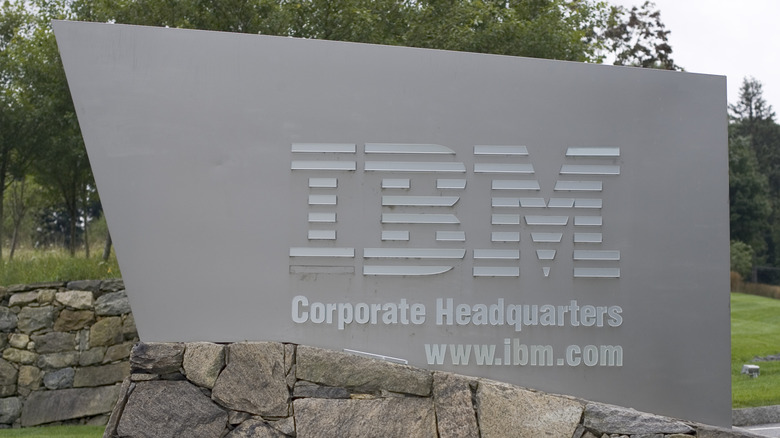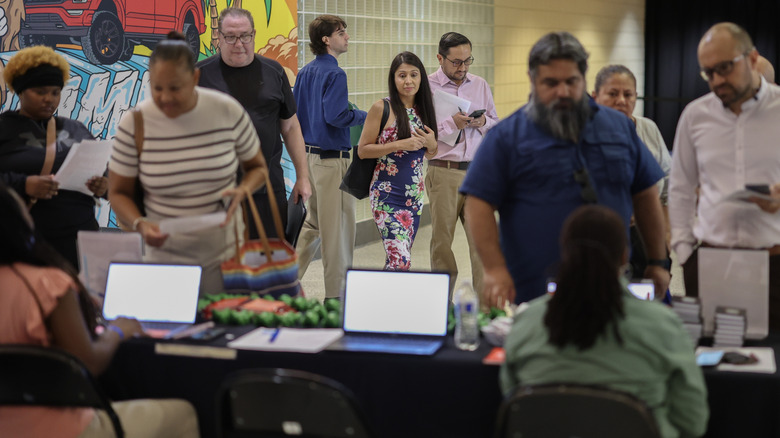IBM Replaced Employees With AI And Made A Fascinating Discovery
Innovations in artificial intelligence are among the various reasons why companies are shedding jobs, pulling back on hiring, and eliminating positions. AI enabled tech companies Microsoft, Meta, and Google to announce huge layoffs in 2025. The massive food and beverage company Nestlé also announced it was cutting 16,000 jobs worldwide, many of which were replaced with automation and AI. And the CEO of Amazon, a corporation that will soon pay a $2.5 billion settlement to eligible Amazon Prime customers, hinted there would be further AI-initiated job cuts in a letter to shareholders.
Yet it turns out that when corporations do invest in AI, it can eventually lead to the creation of more jobs. At least, that was the case with IBM when, in 2023, it eliminated 8,000 jobs as it utilized an artificial intelligence program, AskHR, to automate 94% of the company's human resources functions.
Two years later, IBM CEO Arvind Krishna revealed to the Wall Street Journal that his company's "total employment has actually gone up" as it seeks to employ software engineers and sales and marketing staff who are focused on "critical thinking" to do less systematic jobs that "face up or against other humans."
What IBM's lesson means for job creation in the future
In other words, IBM still needed people to handle tasks that dealt with people. This was found out in 2024 when, on the positive side, IBM reported saving $3.5 billion through its use of AskHR as it handled more than 11.5 million interactions. Unfortunately, IBM's AskHR could not deal with complicated workplace issues, ethical problems, and other things that required a human touch, per online magazine Resident.
IBM's discovery mirrored what the World Economic Forum's (WEF) Future of Jobs Report outlined: that AI will make 92 million jobs disappear but create another 170 million new jobs between 2025 and 2030. The jobs that are expected to grow are positions requiring critical thinking, human interaction, and opposable thumbs. This means farmworkers, salespeople, food processing workers, healthcare workers, social workers, counselling professionals, construction workers, delivery drivers, and teachers could be safe, or even see an outright growth in their opportunities.
On the tech side, big data specialists, financial technology engineers, machine learning specialists, and experienced software and application developers will remain in high demand. The report also anticipates there will be big growth in renewable energy engineering jobs.
This doesn't change that AI is currently killing jobs
The jobs that will continue to head toward the chopping block thanks to AI include administrative assistants, data entry clerks, ticket clerks, and cashiers. Additionally, the WEF estimates that 39% of employees can expect to see their skills either altered or outdated by 2030, meaning a large portion of today's global workforce will need to be retrained within a few years.
This disruptive trend is taking place in entry-level white-collar jobs, too. Chatbots and artificial intelligence programs are replacing the tasks once done by junior software developers, paralegals, retail associates, and even newly graduated attorneys "who once cut their teeth on document review," LinkedIn chief economic opportunity officer Aneesh Raman wrote in a New York Times op-ed.
Andy Challenger, an outplacement consultant at Challenger, Gray & Christmas, told Bankrate that AI was among the many reasons why companies are letting people go. President Donald Trump's tariffs have had an impact on the job market as well, as companies struggle to absorb the new taxes his administration has put on imports along with a sluggish economy and an overall hangover from the post-pandemic hiring boom.


